Leadership Research Proposal: CIBC FirstCaribbean Bank, Analysis
VerifiedAdded on 2022/10/02
|13
|2475
|15
Report
AI Summary
This research proposal focuses on leadership within CIBC FirstCaribbean International Bank, addressing the impact of de-risking by international banks on local Caribbean banks. The study investigates the potential of digital currency systems to mitigate these challenges, utilizing survey and descriptive case study research designs. The proposal outlines the use of surveys for data collection, random sampling, and statistical data analysis. It explores the significance of leadership in driving organizational change and employee motivation during the transition to digital currency. The research aims to identify key management functions and the impact of leadership styles on employee inspiration. The literature review emphasizes the benefits of digital currency, including lower costs, increased efficiency, and enhanced security. The study acknowledges potential limitations, such as access to certain case studies due to pricing or limited access rights, but aims to provide valuable insights for future banking practices in the Caribbean region.
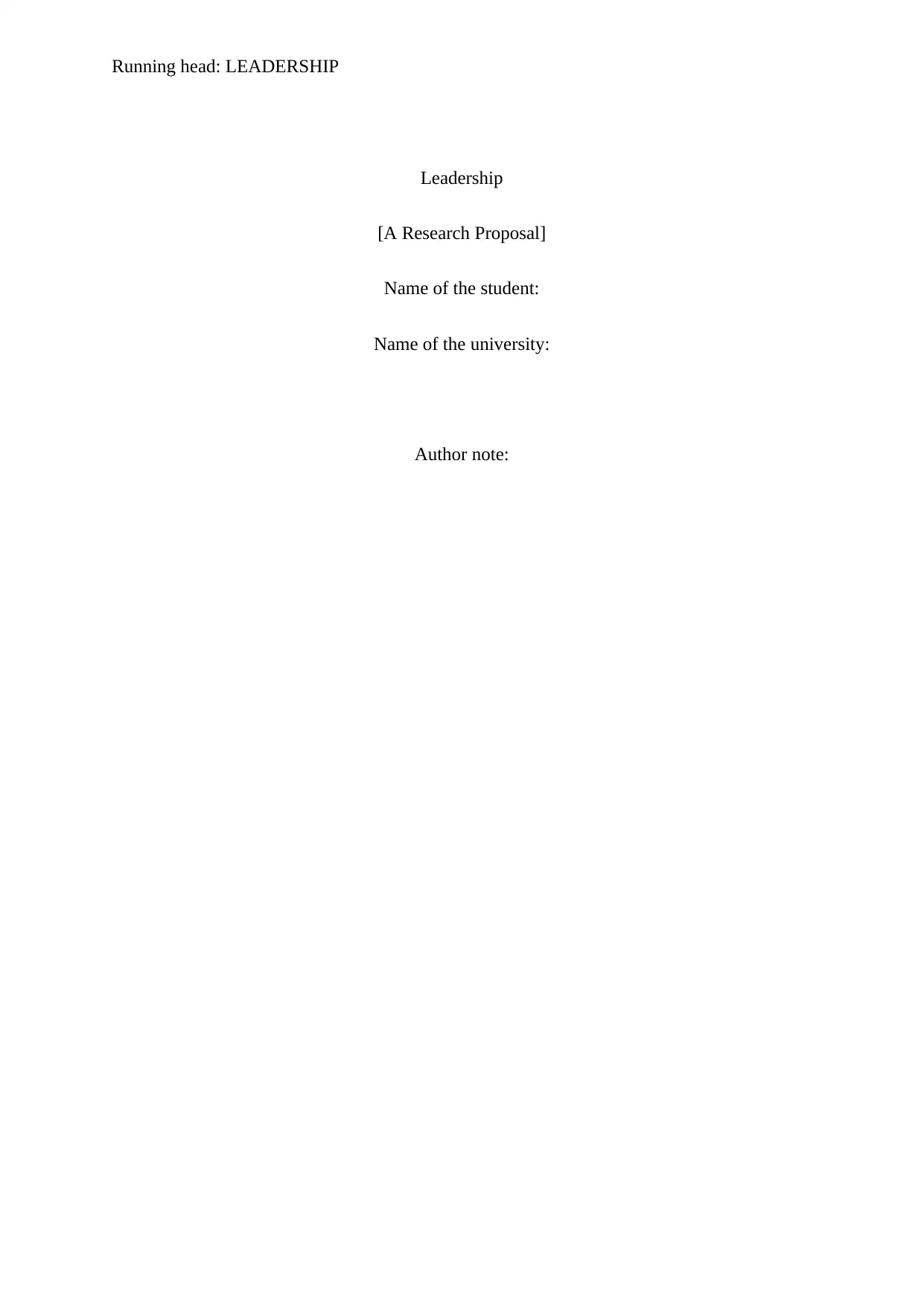
Running head: LEADERSHIP
Leadership
[A Research Proposal]
Name of the student:
Name of the university:
Author note:
Leadership
[A Research Proposal]
Name of the student:
Name of the university:
Author note:
Paraphrase This Document
Need a fresh take? Get an instant paraphrase of this document with our AI Paraphraser
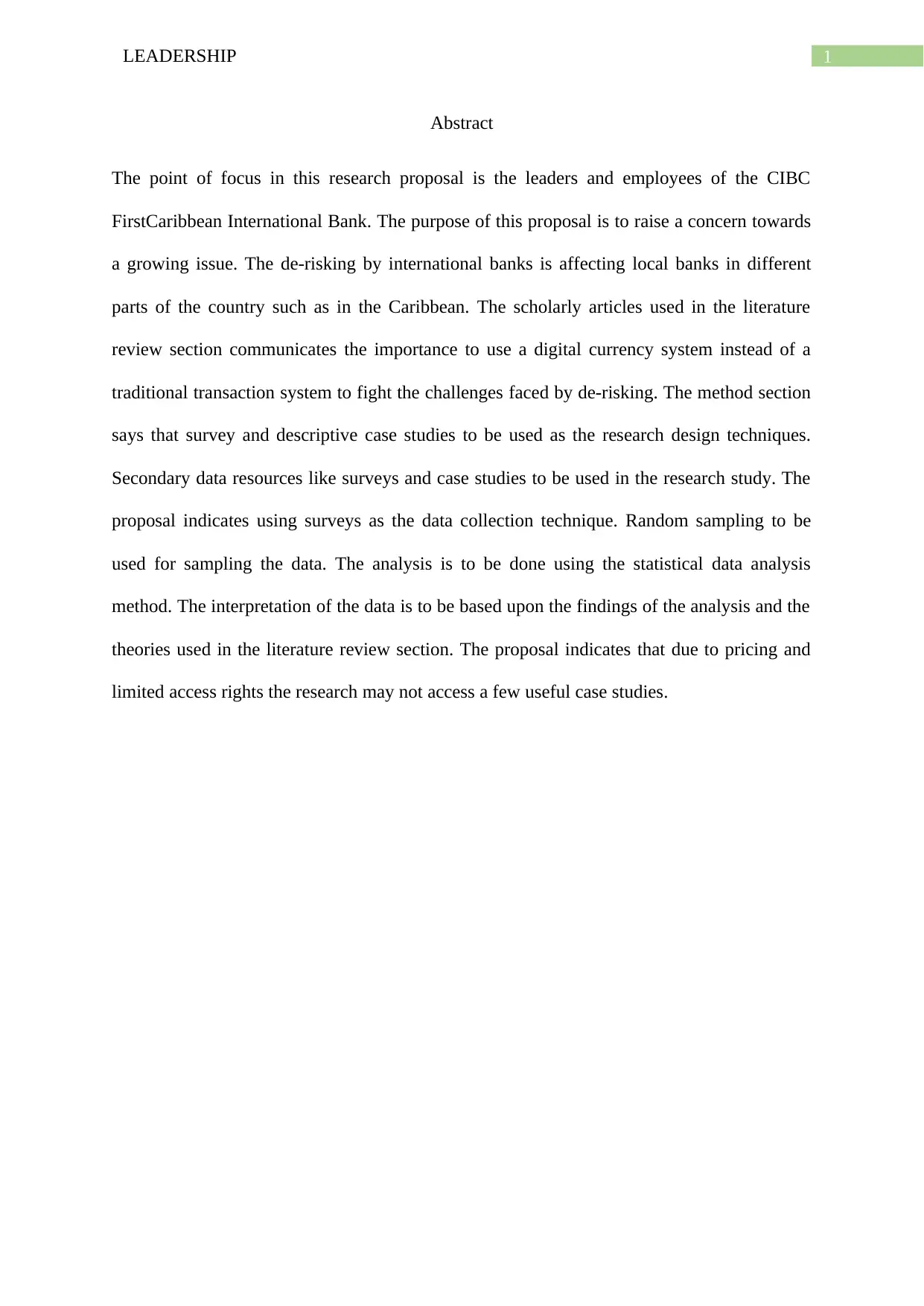
1LEADERSHIP
Abstract
The point of focus in this research proposal is the leaders and employees of the CIBC
FirstCaribbean International Bank. The purpose of this proposal is to raise a concern towards
a growing issue. The de-risking by international banks is affecting local banks in different
parts of the country such as in the Caribbean. The scholarly articles used in the literature
review section communicates the importance to use a digital currency system instead of a
traditional transaction system to fight the challenges faced by de-risking. The method section
says that survey and descriptive case studies to be used as the research design techniques.
Secondary data resources like surveys and case studies to be used in the research study. The
proposal indicates using surveys as the data collection technique. Random sampling to be
used for sampling the data. The analysis is to be done using the statistical data analysis
method. The interpretation of the data is to be based upon the findings of the analysis and the
theories used in the literature review section. The proposal indicates that due to pricing and
limited access rights the research may not access a few useful case studies.
Abstract
The point of focus in this research proposal is the leaders and employees of the CIBC
FirstCaribbean International Bank. The purpose of this proposal is to raise a concern towards
a growing issue. The de-risking by international banks is affecting local banks in different
parts of the country such as in the Caribbean. The scholarly articles used in the literature
review section communicates the importance to use a digital currency system instead of a
traditional transaction system to fight the challenges faced by de-risking. The method section
says that survey and descriptive case studies to be used as the research design techniques.
Secondary data resources like surveys and case studies to be used in the research study. The
proposal indicates using surveys as the data collection technique. Random sampling to be
used for sampling the data. The analysis is to be done using the statistical data analysis
method. The interpretation of the data is to be based upon the findings of the analysis and the
theories used in the literature review section. The proposal indicates that due to pricing and
limited access rights the research may not access a few useful case studies.
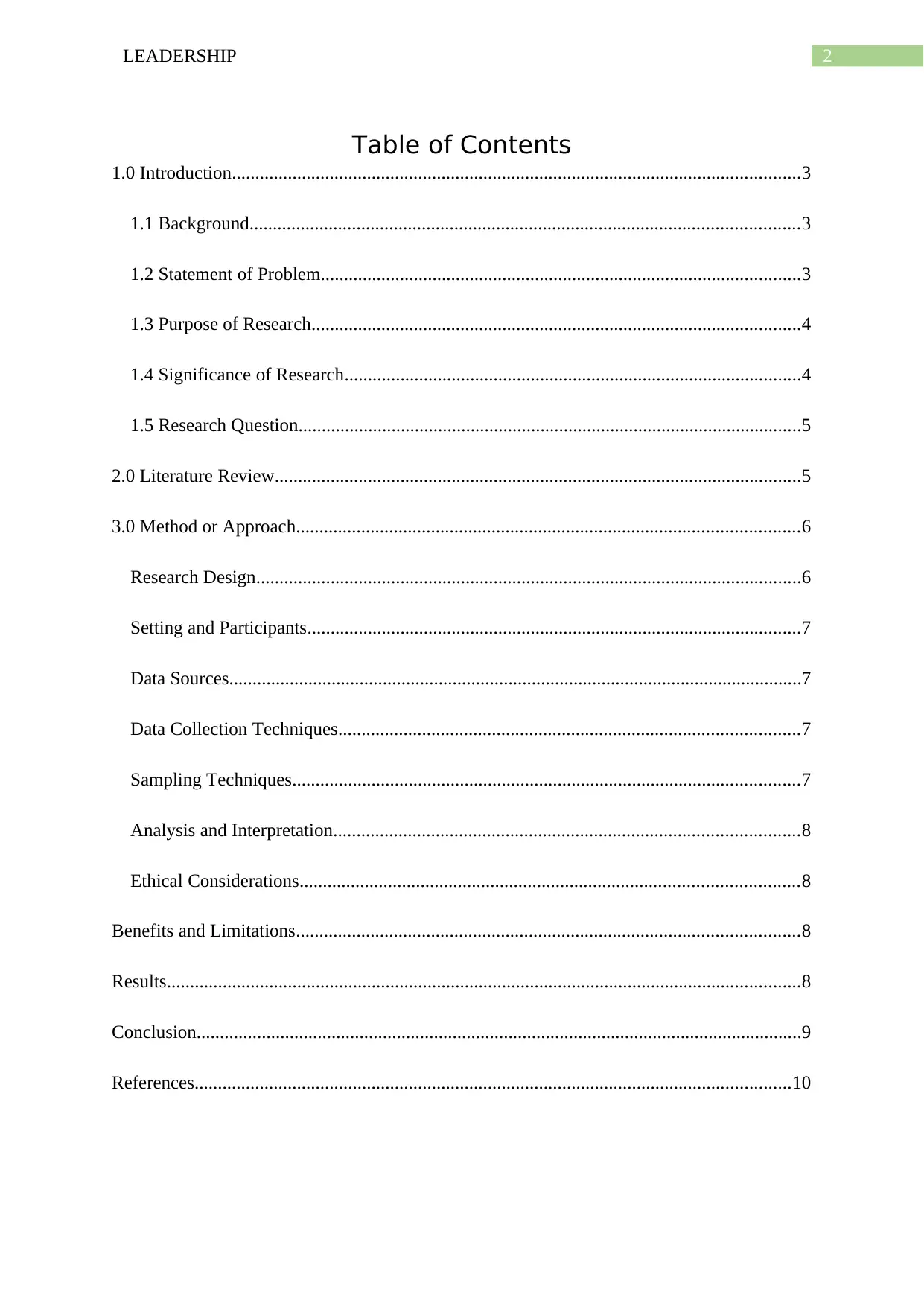
2LEADERSHIP
Table of Contents
1.0 Introduction..........................................................................................................................3
1.1 Background......................................................................................................................3
1.2 Statement of Problem.......................................................................................................3
1.3 Purpose of Research.........................................................................................................4
1.4 Significance of Research..................................................................................................4
1.5 Research Question............................................................................................................5
2.0 Literature Review.................................................................................................................5
3.0 Method or Approach............................................................................................................6
Research Design.....................................................................................................................6
Setting and Participants..........................................................................................................7
Data Sources...........................................................................................................................7
Data Collection Techniques...................................................................................................7
Sampling Techniques.............................................................................................................7
Analysis and Interpretation....................................................................................................8
Ethical Considerations...........................................................................................................8
Benefits and Limitations............................................................................................................8
Results........................................................................................................................................8
Conclusion..................................................................................................................................9
References................................................................................................................................10
Table of Contents
1.0 Introduction..........................................................................................................................3
1.1 Background......................................................................................................................3
1.2 Statement of Problem.......................................................................................................3
1.3 Purpose of Research.........................................................................................................4
1.4 Significance of Research..................................................................................................4
1.5 Research Question............................................................................................................5
2.0 Literature Review.................................................................................................................5
3.0 Method or Approach............................................................................................................6
Research Design.....................................................................................................................6
Setting and Participants..........................................................................................................7
Data Sources...........................................................................................................................7
Data Collection Techniques...................................................................................................7
Sampling Techniques.............................................................................................................7
Analysis and Interpretation....................................................................................................8
Ethical Considerations...........................................................................................................8
Benefits and Limitations............................................................................................................8
Results........................................................................................................................................8
Conclusion..................................................................................................................................9
References................................................................................................................................10
⊘ This is a preview!⊘
Do you want full access?
Subscribe today to unlock all pages.

Trusted by 1+ million students worldwide

3LEADERSHIP
Paraphrase This Document
Need a fresh take? Get an instant paraphrase of this document with our AI Paraphraser
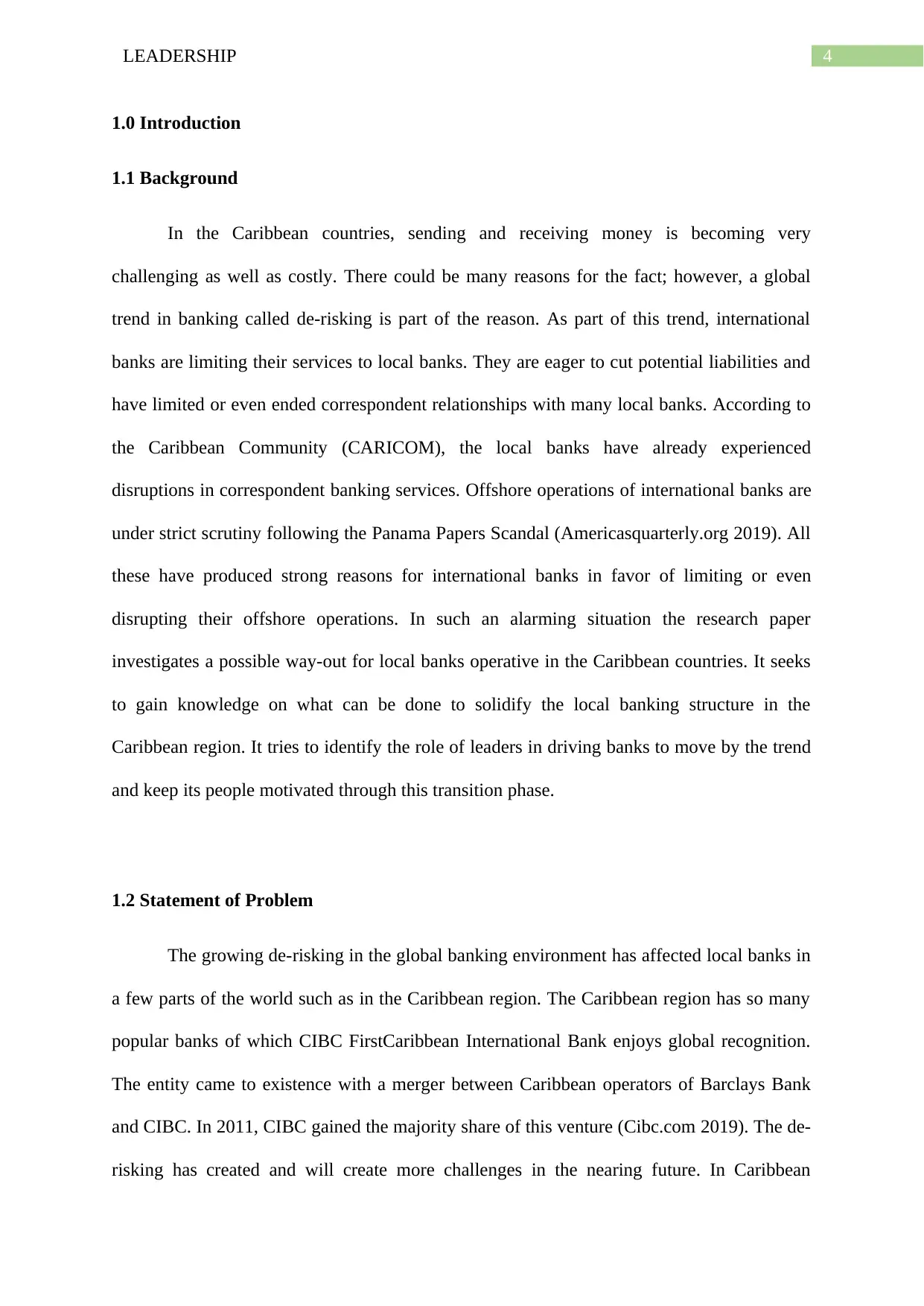
4LEADERSHIP
1.0 Introduction
1.1 Background
In the Caribbean countries, sending and receiving money is becoming very
challenging as well as costly. There could be many reasons for the fact; however, a global
trend in banking called de-risking is part of the reason. As part of this trend, international
banks are limiting their services to local banks. They are eager to cut potential liabilities and
have limited or even ended correspondent relationships with many local banks. According to
the Caribbean Community (CARICOM), the local banks have already experienced
disruptions in correspondent banking services. Offshore operations of international banks are
under strict scrutiny following the Panama Papers Scandal (Americasquarterly.org 2019). All
these have produced strong reasons for international banks in favor of limiting or even
disrupting their offshore operations. In such an alarming situation the research paper
investigates a possible way-out for local banks operative in the Caribbean countries. It seeks
to gain knowledge on what can be done to solidify the local banking structure in the
Caribbean region. It tries to identify the role of leaders in driving banks to move by the trend
and keep its people motivated through this transition phase.
1.2 Statement of Problem
The growing de-risking in the global banking environment has affected local banks in
a few parts of the world such as in the Caribbean region. The Caribbean region has so many
popular banks of which CIBC FirstCaribbean International Bank enjoys global recognition.
The entity came to existence with a merger between Caribbean operators of Barclays Bank
and CIBC. In 2011, CIBC gained the majority share of this venture (Cibc.com 2019). The de-
risking has created and will create more challenges in the nearing future. In Caribbean
1.0 Introduction
1.1 Background
In the Caribbean countries, sending and receiving money is becoming very
challenging as well as costly. There could be many reasons for the fact; however, a global
trend in banking called de-risking is part of the reason. As part of this trend, international
banks are limiting their services to local banks. They are eager to cut potential liabilities and
have limited or even ended correspondent relationships with many local banks. According to
the Caribbean Community (CARICOM), the local banks have already experienced
disruptions in correspondent banking services. Offshore operations of international banks are
under strict scrutiny following the Panama Papers Scandal (Americasquarterly.org 2019). All
these have produced strong reasons for international banks in favor of limiting or even
disrupting their offshore operations. In such an alarming situation the research paper
investigates a possible way-out for local banks operative in the Caribbean countries. It seeks
to gain knowledge on what can be done to solidify the local banking structure in the
Caribbean region. It tries to identify the role of leaders in driving banks to move by the trend
and keep its people motivated through this transition phase.
1.2 Statement of Problem
The growing de-risking in the global banking environment has affected local banks in
a few parts of the world such as in the Caribbean region. The Caribbean region has so many
popular banks of which CIBC FirstCaribbean International Bank enjoys global recognition.
The entity came to existence with a merger between Caribbean operators of Barclays Bank
and CIBC. In 2011, CIBC gained the majority share of this venture (Cibc.com 2019). The de-
risking has created and will create more challenges in the nearing future. In Caribbean
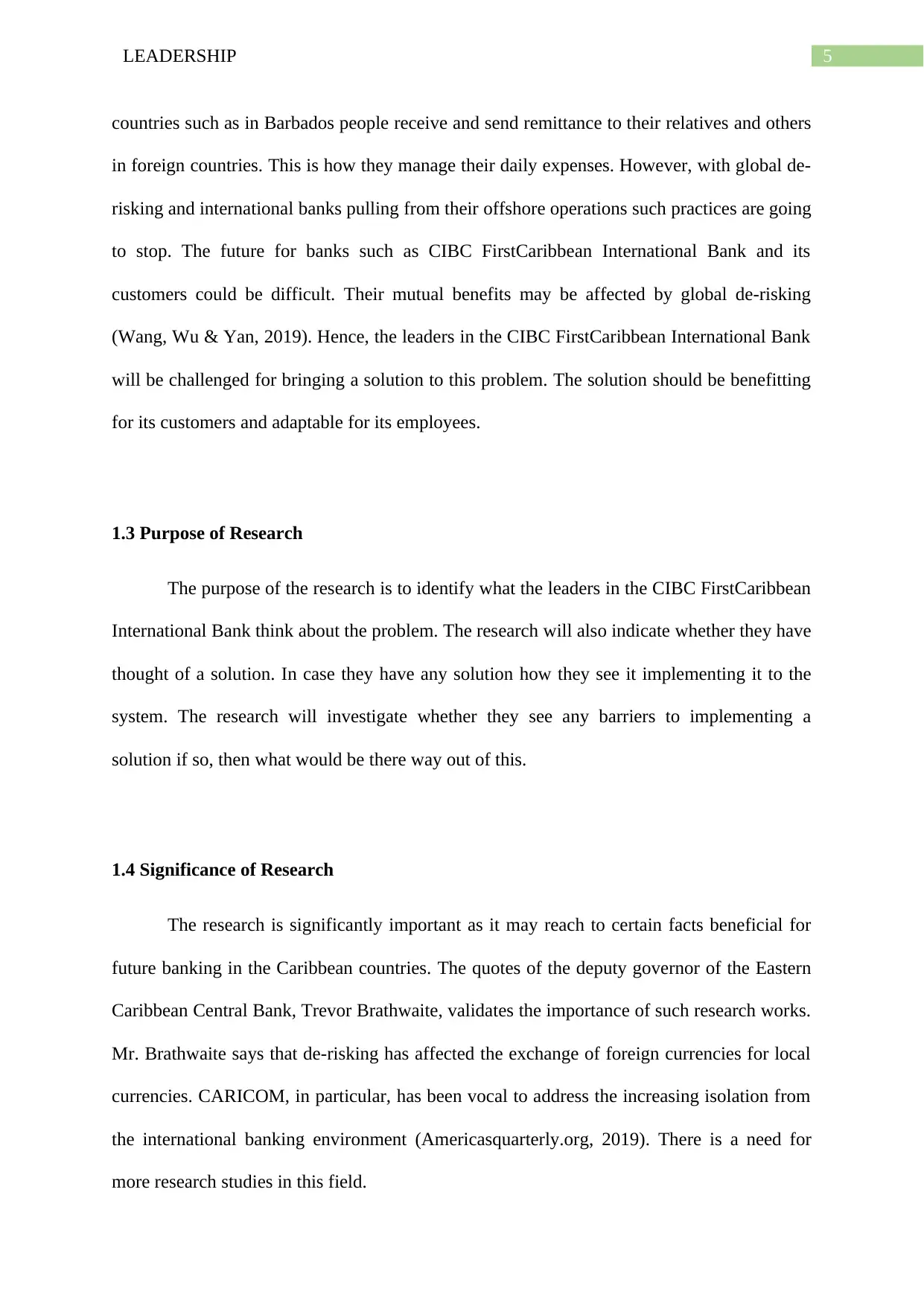
5LEADERSHIP
countries such as in Barbados people receive and send remittance to their relatives and others
in foreign countries. This is how they manage their daily expenses. However, with global de-
risking and international banks pulling from their offshore operations such practices are going
to stop. The future for banks such as CIBC FirstCaribbean International Bank and its
customers could be difficult. Their mutual benefits may be affected by global de-risking
(Wang, Wu & Yan, 2019). Hence, the leaders in the CIBC FirstCaribbean International Bank
will be challenged for bringing a solution to this problem. The solution should be benefitting
for its customers and adaptable for its employees.
1.3 Purpose of Research
The purpose of the research is to identify what the leaders in the CIBC FirstCaribbean
International Bank think about the problem. The research will also indicate whether they have
thought of a solution. In case they have any solution how they see it implementing it to the
system. The research will investigate whether they see any barriers to implementing a
solution if so, then what would be there way out of this.
1.4 Significance of Research
The research is significantly important as it may reach to certain facts beneficial for
future banking in the Caribbean countries. The quotes of the deputy governor of the Eastern
Caribbean Central Bank, Trevor Brathwaite, validates the importance of such research works.
Mr. Brathwaite says that de-risking has affected the exchange of foreign currencies for local
currencies. CARICOM, in particular, has been vocal to address the increasing isolation from
the international banking environment (Americasquarterly.org, 2019). There is a need for
more research studies in this field.
countries such as in Barbados people receive and send remittance to their relatives and others
in foreign countries. This is how they manage their daily expenses. However, with global de-
risking and international banks pulling from their offshore operations such practices are going
to stop. The future for banks such as CIBC FirstCaribbean International Bank and its
customers could be difficult. Their mutual benefits may be affected by global de-risking
(Wang, Wu & Yan, 2019). Hence, the leaders in the CIBC FirstCaribbean International Bank
will be challenged for bringing a solution to this problem. The solution should be benefitting
for its customers and adaptable for its employees.
1.3 Purpose of Research
The purpose of the research is to identify what the leaders in the CIBC FirstCaribbean
International Bank think about the problem. The research will also indicate whether they have
thought of a solution. In case they have any solution how they see it implementing it to the
system. The research will investigate whether they see any barriers to implementing a
solution if so, then what would be there way out of this.
1.4 Significance of Research
The research is significantly important as it may reach to certain facts beneficial for
future banking in the Caribbean countries. The quotes of the deputy governor of the Eastern
Caribbean Central Bank, Trevor Brathwaite, validates the importance of such research works.
Mr. Brathwaite says that de-risking has affected the exchange of foreign currencies for local
currencies. CARICOM, in particular, has been vocal to address the increasing isolation from
the international banking environment (Americasquarterly.org, 2019). There is a need for
more research studies in this field.
⊘ This is a preview!⊘
Do you want full access?
Subscribe today to unlock all pages.

Trusted by 1+ million students worldwide
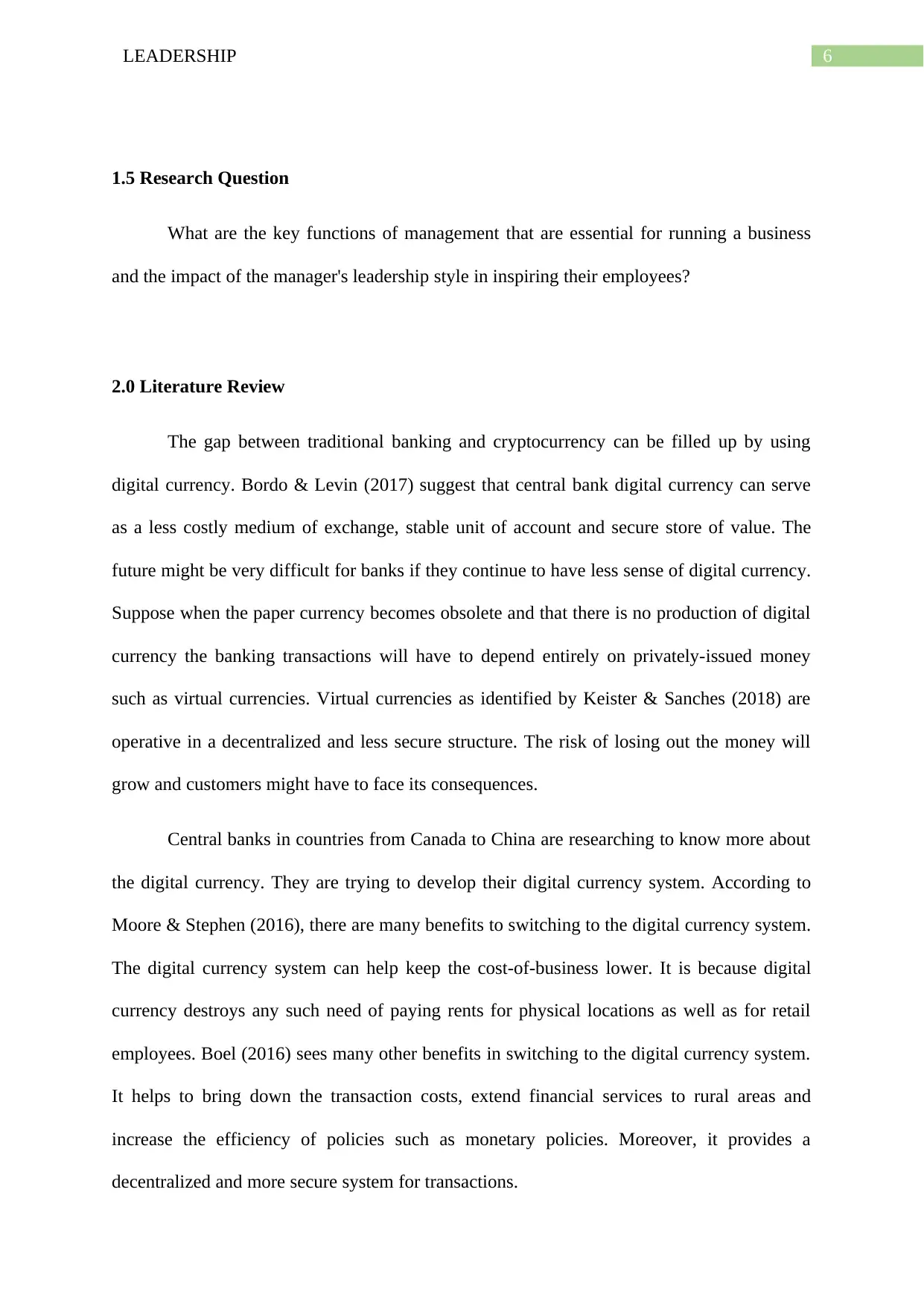
6LEADERSHIP
1.5 Research Question
What are the key functions of management that are essential for running a business
and the impact of the manager's leadership style in inspiring their employees?
2.0 Literature Review
The gap between traditional banking and cryptocurrency can be filled up by using
digital currency. Bordo & Levin (2017) suggest that central bank digital currency can serve
as a less costly medium of exchange, stable unit of account and secure store of value. The
future might be very difficult for banks if they continue to have less sense of digital currency.
Suppose when the paper currency becomes obsolete and that there is no production of digital
currency the banking transactions will have to depend entirely on privately-issued money
such as virtual currencies. Virtual currencies as identified by Keister & Sanches (2018) are
operative in a decentralized and less secure structure. The risk of losing out the money will
grow and customers might have to face its consequences.
Central banks in countries from Canada to China are researching to know more about
the digital currency. They are trying to develop their digital currency system. According to
Moore & Stephen (2016), there are many benefits to switching to the digital currency system.
The digital currency system can help keep the cost-of-business lower. It is because digital
currency destroys any such need of paying rents for physical locations as well as for retail
employees. Boel (2016) sees many other benefits in switching to the digital currency system.
It helps to bring down the transaction costs, extend financial services to rural areas and
increase the efficiency of policies such as monetary policies. Moreover, it provides a
decentralized and more secure system for transactions.
1.5 Research Question
What are the key functions of management that are essential for running a business
and the impact of the manager's leadership style in inspiring their employees?
2.0 Literature Review
The gap between traditional banking and cryptocurrency can be filled up by using
digital currency. Bordo & Levin (2017) suggest that central bank digital currency can serve
as a less costly medium of exchange, stable unit of account and secure store of value. The
future might be very difficult for banks if they continue to have less sense of digital currency.
Suppose when the paper currency becomes obsolete and that there is no production of digital
currency the banking transactions will have to depend entirely on privately-issued money
such as virtual currencies. Virtual currencies as identified by Keister & Sanches (2018) are
operative in a decentralized and less secure structure. The risk of losing out the money will
grow and customers might have to face its consequences.
Central banks in countries from Canada to China are researching to know more about
the digital currency. They are trying to develop their digital currency system. According to
Moore & Stephen (2016), there are many benefits to switching to the digital currency system.
The digital currency system can help keep the cost-of-business lower. It is because digital
currency destroys any such need of paying rents for physical locations as well as for retail
employees. Boel (2016) sees many other benefits in switching to the digital currency system.
It helps to bring down the transaction costs, extend financial services to rural areas and
increase the efficiency of policies such as monetary policies. Moreover, it provides a
decentralized and more secure system for transactions.
Paraphrase This Document
Need a fresh take? Get an instant paraphrase of this document with our AI Paraphraser
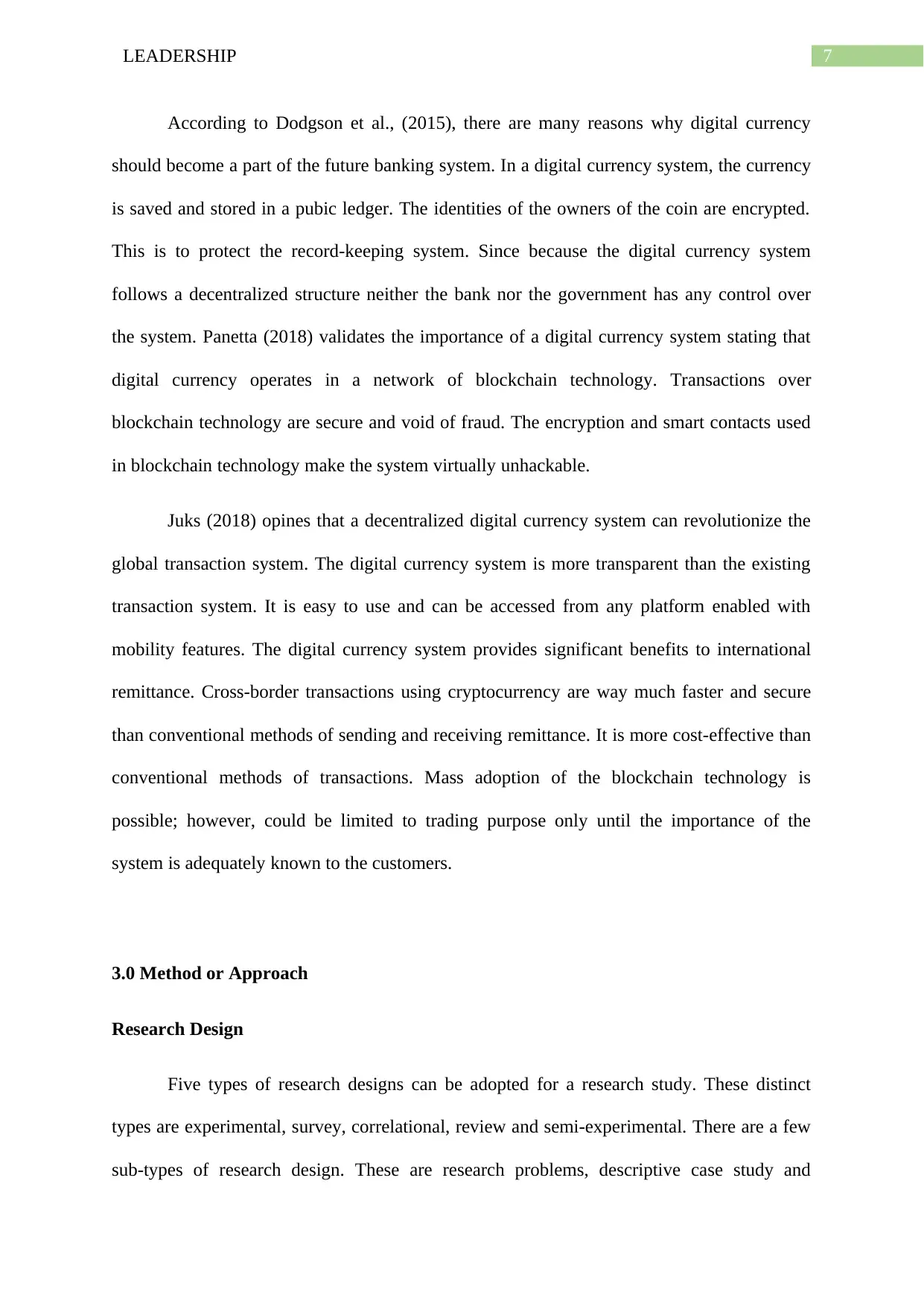
7LEADERSHIP
According to Dodgson et al., (2015), there are many reasons why digital currency
should become a part of the future banking system. In a digital currency system, the currency
is saved and stored in a pubic ledger. The identities of the owners of the coin are encrypted.
This is to protect the record-keeping system. Since because the digital currency system
follows a decentralized structure neither the bank nor the government has any control over
the system. Panetta (2018) validates the importance of a digital currency system stating that
digital currency operates in a network of blockchain technology. Transactions over
blockchain technology are secure and void of fraud. The encryption and smart contacts used
in blockchain technology make the system virtually unhackable.
Juks (2018) opines that a decentralized digital currency system can revolutionize the
global transaction system. The digital currency system is more transparent than the existing
transaction system. It is easy to use and can be accessed from any platform enabled with
mobility features. The digital currency system provides significant benefits to international
remittance. Cross-border transactions using cryptocurrency are way much faster and secure
than conventional methods of sending and receiving remittance. It is more cost-effective than
conventional methods of transactions. Mass adoption of the blockchain technology is
possible; however, could be limited to trading purpose only until the importance of the
system is adequately known to the customers.
3.0 Method or Approach
Research Design
Five types of research designs can be adopted for a research study. These distinct
types are experimental, survey, correlational, review and semi-experimental. There are a few
sub-types of research design. These are research problems, descriptive case study and
According to Dodgson et al., (2015), there are many reasons why digital currency
should become a part of the future banking system. In a digital currency system, the currency
is saved and stored in a pubic ledger. The identities of the owners of the coin are encrypted.
This is to protect the record-keeping system. Since because the digital currency system
follows a decentralized structure neither the bank nor the government has any control over
the system. Panetta (2018) validates the importance of a digital currency system stating that
digital currency operates in a network of blockchain technology. Transactions over
blockchain technology are secure and void of fraud. The encryption and smart contacts used
in blockchain technology make the system virtually unhackable.
Juks (2018) opines that a decentralized digital currency system can revolutionize the
global transaction system. The digital currency system is more transparent than the existing
transaction system. It is easy to use and can be accessed from any platform enabled with
mobility features. The digital currency system provides significant benefits to international
remittance. Cross-border transactions using cryptocurrency are way much faster and secure
than conventional methods of sending and receiving remittance. It is more cost-effective than
conventional methods of transactions. Mass adoption of the blockchain technology is
possible; however, could be limited to trading purpose only until the importance of the
system is adequately known to the customers.
3.0 Method or Approach
Research Design
Five types of research designs can be adopted for a research study. These distinct
types are experimental, survey, correlational, review and semi-experimental. There are a few
sub-types of research design. These are research problems, descriptive case study and
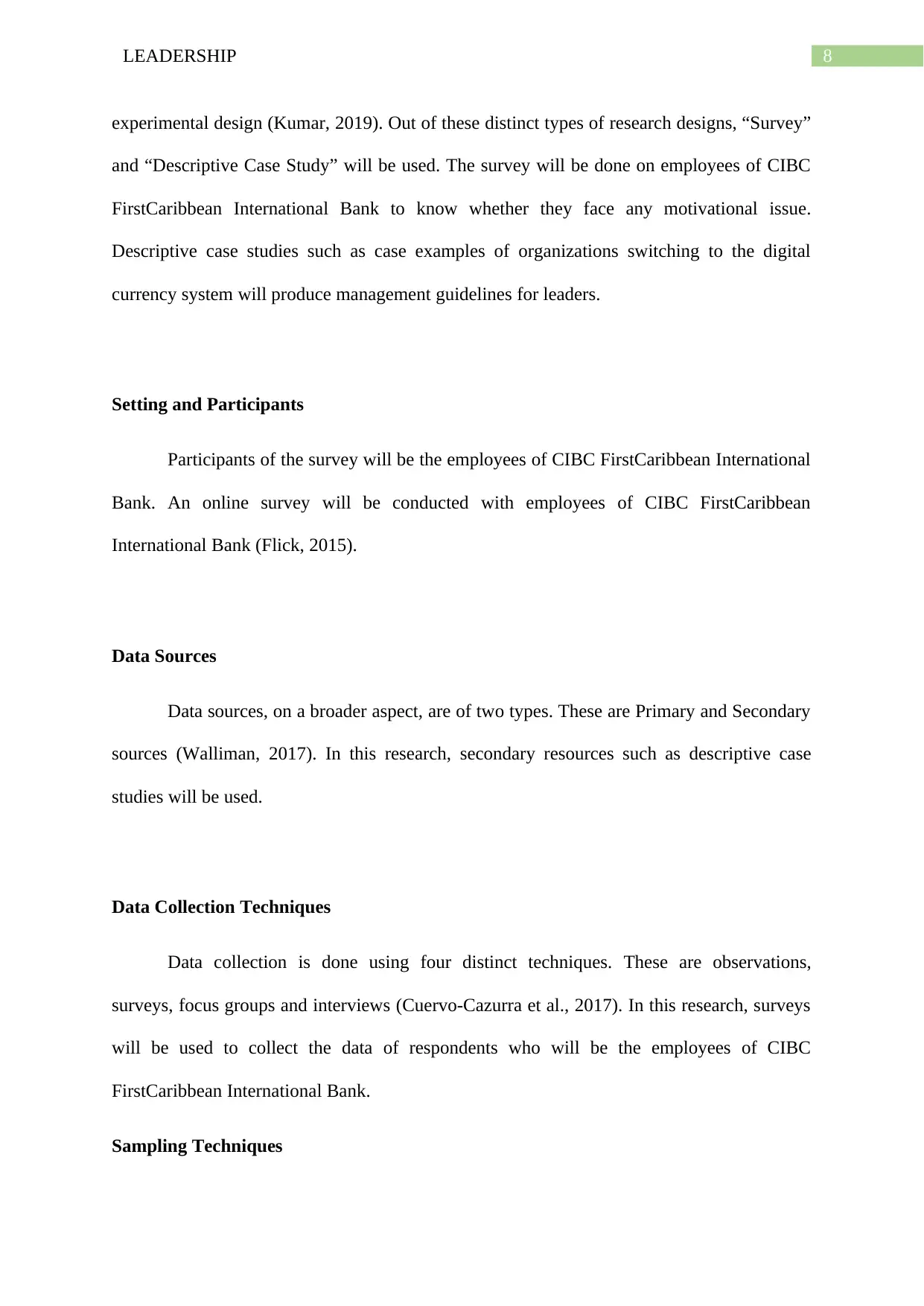
8LEADERSHIP
experimental design (Kumar, 2019). Out of these distinct types of research designs, “Survey”
and “Descriptive Case Study” will be used. The survey will be done on employees of CIBC
FirstCaribbean International Bank to know whether they face any motivational issue.
Descriptive case studies such as case examples of organizations switching to the digital
currency system will produce management guidelines for leaders.
Setting and Participants
Participants of the survey will be the employees of CIBC FirstCaribbean International
Bank. An online survey will be conducted with employees of CIBC FirstCaribbean
International Bank (Flick, 2015).
Data Sources
Data sources, on a broader aspect, are of two types. These are Primary and Secondary
sources (Walliman, 2017). In this research, secondary resources such as descriptive case
studies will be used.
Data Collection Techniques
Data collection is done using four distinct techniques. These are observations,
surveys, focus groups and interviews (Cuervo‐Cazurra et al., 2017). In this research, surveys
will be used to collect the data of respondents who will be the employees of CIBC
FirstCaribbean International Bank.
Sampling Techniques
experimental design (Kumar, 2019). Out of these distinct types of research designs, “Survey”
and “Descriptive Case Study” will be used. The survey will be done on employees of CIBC
FirstCaribbean International Bank to know whether they face any motivational issue.
Descriptive case studies such as case examples of organizations switching to the digital
currency system will produce management guidelines for leaders.
Setting and Participants
Participants of the survey will be the employees of CIBC FirstCaribbean International
Bank. An online survey will be conducted with employees of CIBC FirstCaribbean
International Bank (Flick, 2015).
Data Sources
Data sources, on a broader aspect, are of two types. These are Primary and Secondary
sources (Walliman, 2017). In this research, secondary resources such as descriptive case
studies will be used.
Data Collection Techniques
Data collection is done using four distinct techniques. These are observations,
surveys, focus groups and interviews (Cuervo‐Cazurra et al., 2017). In this research, surveys
will be used to collect the data of respondents who will be the employees of CIBC
FirstCaribbean International Bank.
Sampling Techniques
⊘ This is a preview!⊘
Do you want full access?
Subscribe today to unlock all pages.

Trusted by 1+ million students worldwide
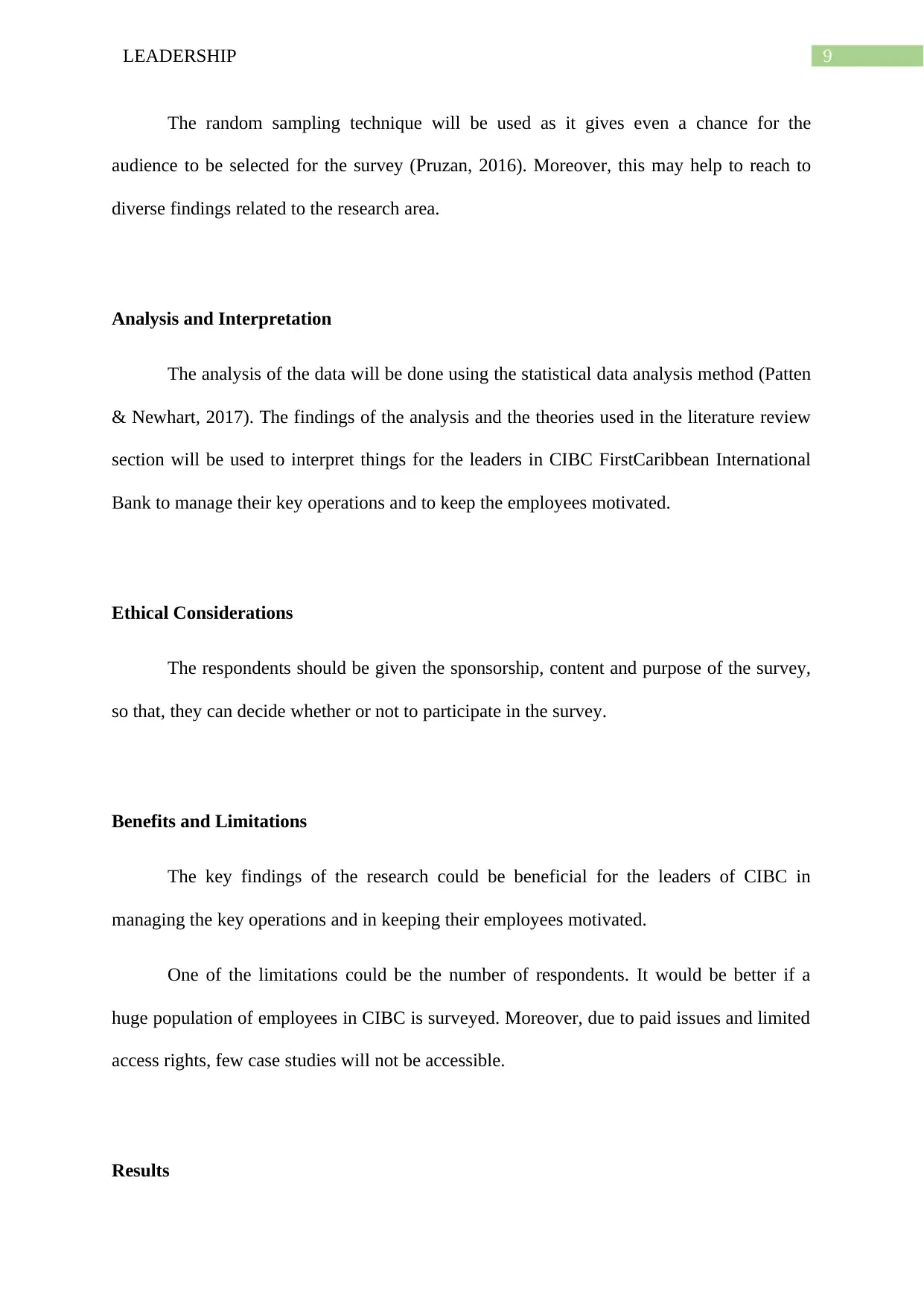
9LEADERSHIP
The random sampling technique will be used as it gives even a chance for the
audience to be selected for the survey (Pruzan, 2016). Moreover, this may help to reach to
diverse findings related to the research area.
Analysis and Interpretation
The analysis of the data will be done using the statistical data analysis method (Patten
& Newhart, 2017). The findings of the analysis and the theories used in the literature review
section will be used to interpret things for the leaders in CIBC FirstCaribbean International
Bank to manage their key operations and to keep the employees motivated.
Ethical Considerations
The respondents should be given the sponsorship, content and purpose of the survey,
so that, they can decide whether or not to participate in the survey.
Benefits and Limitations
The key findings of the research could be beneficial for the leaders of CIBC in
managing the key operations and in keeping their employees motivated.
One of the limitations could be the number of respondents. It would be better if a
huge population of employees in CIBC is surveyed. Moreover, due to paid issues and limited
access rights, few case studies will not be accessible.
Results
The random sampling technique will be used as it gives even a chance for the
audience to be selected for the survey (Pruzan, 2016). Moreover, this may help to reach to
diverse findings related to the research area.
Analysis and Interpretation
The analysis of the data will be done using the statistical data analysis method (Patten
& Newhart, 2017). The findings of the analysis and the theories used in the literature review
section will be used to interpret things for the leaders in CIBC FirstCaribbean International
Bank to manage their key operations and to keep the employees motivated.
Ethical Considerations
The respondents should be given the sponsorship, content and purpose of the survey,
so that, they can decide whether or not to participate in the survey.
Benefits and Limitations
The key findings of the research could be beneficial for the leaders of CIBC in
managing the key operations and in keeping their employees motivated.
One of the limitations could be the number of respondents. It would be better if a
huge population of employees in CIBC is surveyed. Moreover, due to paid issues and limited
access rights, few case studies will not be accessible.
Results
Paraphrase This Document
Need a fresh take? Get an instant paraphrase of this document with our AI Paraphraser
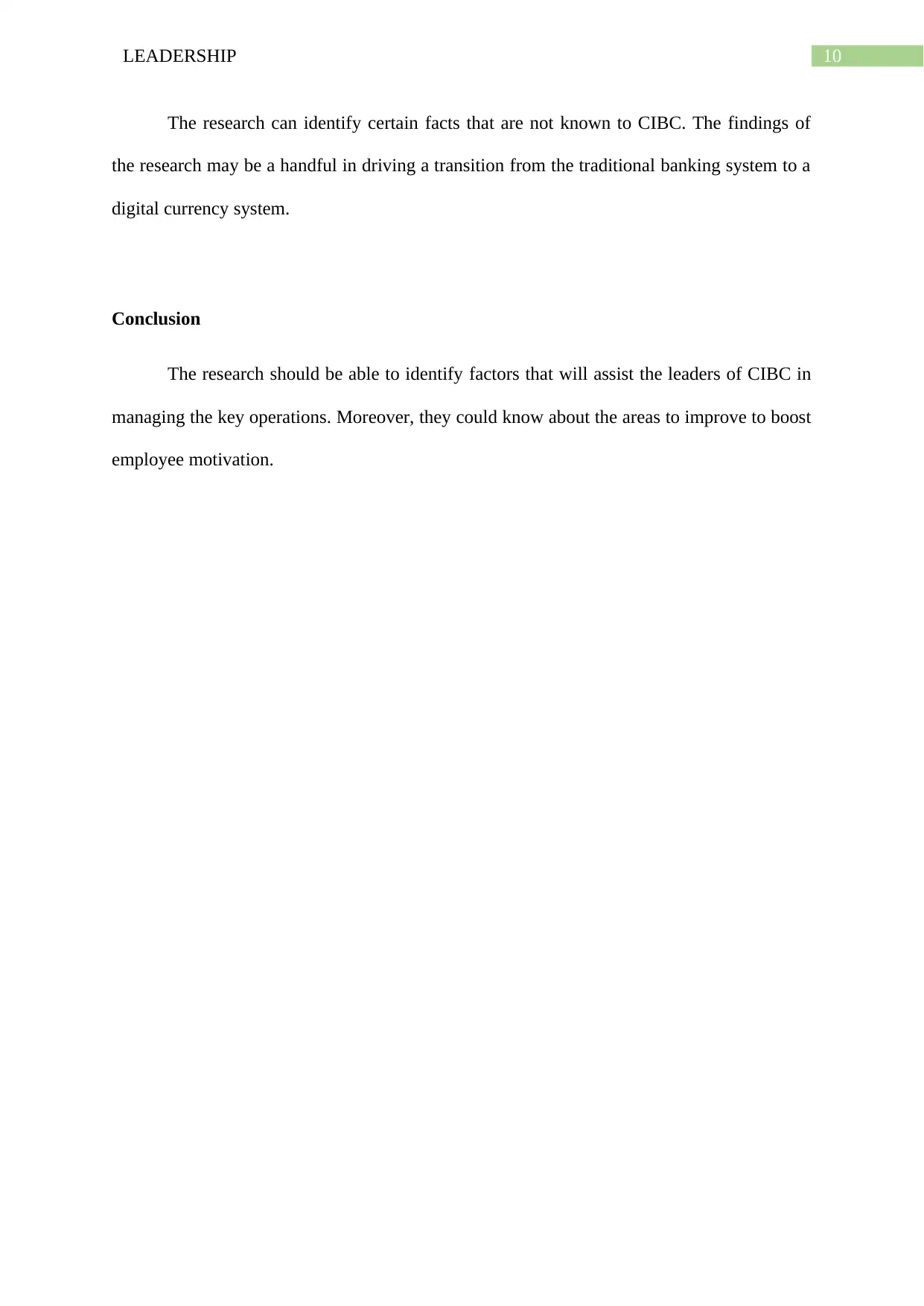
10LEADERSHIP
The research can identify certain facts that are not known to CIBC. The findings of
the research may be a handful in driving a transition from the traditional banking system to a
digital currency system.
Conclusion
The research should be able to identify factors that will assist the leaders of CIBC in
managing the key operations. Moreover, they could know about the areas to improve to boost
employee motivation.
The research can identify certain facts that are not known to CIBC. The findings of
the research may be a handful in driving a transition from the traditional banking system to a
digital currency system.
Conclusion
The research should be able to identify factors that will assist the leaders of CIBC in
managing the key operations. Moreover, they could know about the areas to improve to boost
employee motivation.
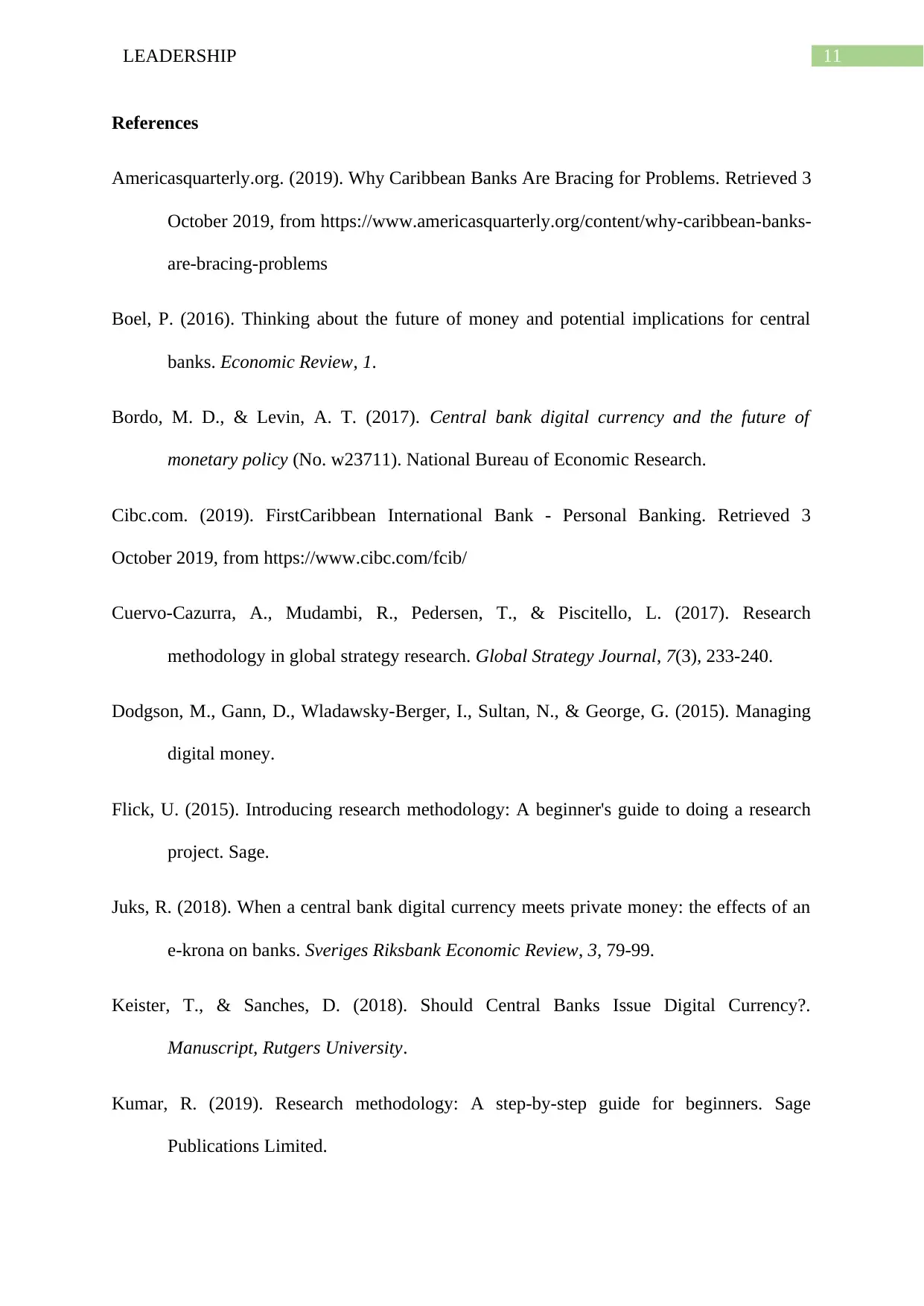
11LEADERSHIP
References
Americasquarterly.org. (2019). Why Caribbean Banks Are Bracing for Problems. Retrieved 3
October 2019, from https://www.americasquarterly.org/content/why-caribbean-banks-
are-bracing-problems
Boel, P. (2016). Thinking about the future of money and potential implications for central
banks. Economic Review, 1.
Bordo, M. D., & Levin, A. T. (2017). Central bank digital currency and the future of
monetary policy (No. w23711). National Bureau of Economic Research.
Cibc.com. (2019). FirstCaribbean International Bank - Personal Banking. Retrieved 3
October 2019, from https://www.cibc.com/fcib/
Cuervo‐Cazurra, A., Mudambi, R., Pedersen, T., & Piscitello, L. (2017). Research
methodology in global strategy research. Global Strategy Journal, 7(3), 233-240.
Dodgson, M., Gann, D., Wladawsky-Berger, I., Sultan, N., & George, G. (2015). Managing
digital money.
Flick, U. (2015). Introducing research methodology: A beginner's guide to doing a research
project. Sage.
Juks, R. (2018). When a central bank digital currency meets private money: the effects of an
e-krona on banks. Sveriges Riksbank Economic Review, 3, 79-99.
Keister, T., & Sanches, D. (2018). Should Central Banks Issue Digital Currency?.
Manuscript, Rutgers University.
Kumar, R. (2019). Research methodology: A step-by-step guide for beginners. Sage
Publications Limited.
References
Americasquarterly.org. (2019). Why Caribbean Banks Are Bracing for Problems. Retrieved 3
October 2019, from https://www.americasquarterly.org/content/why-caribbean-banks-
are-bracing-problems
Boel, P. (2016). Thinking about the future of money and potential implications for central
banks. Economic Review, 1.
Bordo, M. D., & Levin, A. T. (2017). Central bank digital currency and the future of
monetary policy (No. w23711). National Bureau of Economic Research.
Cibc.com. (2019). FirstCaribbean International Bank - Personal Banking. Retrieved 3
October 2019, from https://www.cibc.com/fcib/
Cuervo‐Cazurra, A., Mudambi, R., Pedersen, T., & Piscitello, L. (2017). Research
methodology in global strategy research. Global Strategy Journal, 7(3), 233-240.
Dodgson, M., Gann, D., Wladawsky-Berger, I., Sultan, N., & George, G. (2015). Managing
digital money.
Flick, U. (2015). Introducing research methodology: A beginner's guide to doing a research
project. Sage.
Juks, R. (2018). When a central bank digital currency meets private money: the effects of an
e-krona on banks. Sveriges Riksbank Economic Review, 3, 79-99.
Keister, T., & Sanches, D. (2018). Should Central Banks Issue Digital Currency?.
Manuscript, Rutgers University.
Kumar, R. (2019). Research methodology: A step-by-step guide for beginners. Sage
Publications Limited.
⊘ This is a preview!⊘
Do you want full access?
Subscribe today to unlock all pages.

Trusted by 1+ million students worldwide
1 out of 13
Related Documents
Your All-in-One AI-Powered Toolkit for Academic Success.
+13062052269
info@desklib.com
Available 24*7 on WhatsApp / Email
![[object Object]](/_next/static/media/star-bottom.7253800d.svg)
Unlock your academic potential
Copyright © 2020–2025 A2Z Services. All Rights Reserved. Developed and managed by ZUCOL.




